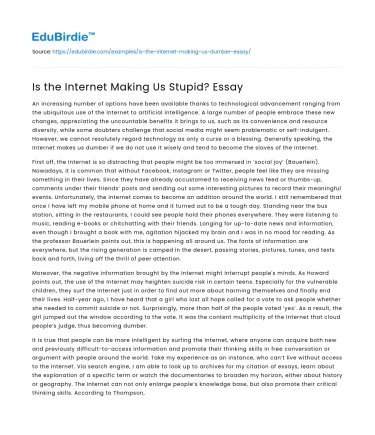An increasing number of options have been available thanks to technological advancement ranging from the ubiquitous use of the Internet to artificial intelligence. A large number of people embrace these new changes, appreciating the uncountable benefits it brings to us, such as its convenience and resource diversity, while some doubters challenge that social media might seem problematic or self-indulgent. However, we cannot resolutely regard technology as only a curse or a blessing. Generally speaking, the Internet makes us dumber if we do not use it wisely and tend to become the slaves of the Internet.
First off, the Internet is so distracting that people might be too immersed in ‘social joy’ (Bauerlein). Nowadays, it is common that without Facebook, Instagram or Twitter, people feel like they are missing something in their lives. Since they have already accustomed to receiving news feed or thumbs-up, comments under their friends’ posts and sending out some interesting pictures to record their meaningful events. Unfortunately, the Internet comes to become an addition around the world. I still remembered that once I have left my mobile phone at home and it turned out to be a tough day. Standing near the bus station, sitting in the restaurants, I could see people hold their phones everywhere. They were listening to music, reading e-books or chitchatting with their friends. Longing for up-to-date news and information, even though I brought a book with me, agitation hijacked my brain and I was in no mood for reading. As the professor Bauerlein points out, this is happening all around us. The fonts of information are everywhere, but the rising generation is camped in the desert, passing stories, pictures, tunes, and texts back and forth, living off the thrill of peer attention.
Save your time!
We can take care of your essay
- Proper editing and formatting
- Free revision, title page, and bibliography
- Flexible prices and money-back guarantee
Moreover, the negative information brought by the Internet might interrupt people's minds. As Howard points out, the use of the Internet may heighten suicide risk in certain teens. Especially for the vulnerable children, they surf the Internet just in order to find out more about harming themselves and finally end their lives. Half-year ago, I have heard that a girl who lost all hope called for a vote to ask people whether she needed to commit suicide or not. Surprisingly, more than half of the people voted ‘yes’. As a result, the girl jumped out the window according to the vote. It was the content multiplicity of the Internet that cloud people’s judge, thus becoming dumber.
It is true that people can be more intelligent by surfing the Internet, where anyone can acquire both new and previously difficult-to-access information and promote their thinking skills in free conversation or argument with people around the world. Take my experience as an instance, who can’t live without access to the Internet. Via search engine, I am able to look up to archives for my citation of essays, learn about the explanation of a specific term or watch the documentaries to broaden my horizon, either about history or geography. The Internet can not only enlarge people’s knowledge base, but also promote their critical thinking skills. According to Thompson, a Canadian journalist, using social media, a large amount of our everyday thinking - powerful, creative, and resonate stuff - is done by people’s getting into discussions and arguments online, no matter it is on Twitter or in a forum about their favorite TV show or even in a thread underneath Instagram photos. However, the situation might not be that desirable. As Carr demonstrates, people using search engine might have an exaggerated sense of their own knowledge. When people expect to have future access to information, they have lower rates of recall the information itself and enhanced recall instead for where to access it, which thus leads to the illusion of knowledge. In addition, the Internet cannot effectively reflect our thoughts on the Internet as well as in face-to-face conversation, since the facial expression, tone of speech and gesture cannot be expressed in words, giving rise to misunderstanding. In conclusion, even though the Internet is efficient enough to do research and strike up a conversation, we cannot fully absorb knowledge and communicate in-depth.
Despite the advantages of the Internet, including easy-to-access information and up-to-date conversation, the Internet also has a side-effect, such as addiction and depression. For people who make bad use of it, the Internet does more harm than good. However, since we create the Internet, we have the capability to figure out how we can prevent ourselves from becoming its slaves, such as putting our electronic gadgets aside and then enjoying reading at the first wisp of sunlight. Even though the Internet might make us dumber, we are able to control ourselves consciously and make it a useful tool.






 Stuck on your essay?
Stuck on your essay?

